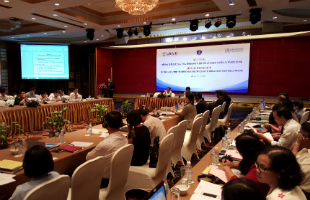
Director of the General Department for Preventive Medicine, Dr Tran Dac Phu;
Distinguished guests and colleagues;
Ladies and Gentlemen,
I am honored to be here on behalf of the World Health Organization to welcome you to the joint WHO-MOH Asia Pacific Strategy for Emerging Diseases (APSED 2010) and International Health Regulations (IHR 2005), review meeting.
APSED has served as the road map for achieving IHR core requirements in the Western Pacific and South East Asia Regions. The bi-regional strategy has provided essential guidance for member states to Strengthen sustainable countries’ capacity and partnership to promote public health security through preparedness planning, prevention, early detection, and rapid response to Emerging Infectious Diseases (EIDs).
The APSED focus areas include surveillance and response, laboratory diagnostic capacity, improved collaboration between the human and animal health sectors, infection prevention and control practices, risk communication, public health emergency preparedness and systems for monitoring and evaluation.
Since the inception of the APSED in 2005, the World Health Organization has been working with the Ministry of Health of Viet Nam to build capacity to respond to emerging infectious disease (EID) threats and public health emergencies (PHE). Viet Nam plays an important role in contributing to regional health security. Recently, Viet Nam reported the achievement of IHR core capacities. I congratulate you on this significant progress made.
Ladies and Gentlemen
In recent years, the emergence of Middle East Respiratory Syndrome coronavirus (MERS-CoV), Avian Influenza H7N9 and Ebola virus disease (EVD) have threatened regional and global health security. Within the last ten years, Viet Nam has experienced a number of outbreaks of newly emerging diseases such as SARS, avian influenza A (H5N1) and pandemic influenza A (H1N1) 2009. Others, such as avian influenza A(H7N9), are on Viet Nam’s doorstep.
These events are reminders that capacities for detection, preparedness and response to public health threats need continuous investment, beyond IHR deadlines. The APSED/IHR capacities are indispensable when it comes to combating the risk of regional and global pandemics.
Before APSED was introduced in 2005, concepts and practices such as Risk Assessment, Risk Communication, Field Epidemiology Training, Rapid Response teams and Emergency Operation Centre were not widely understood or implemented in Viet Nam. In 2015, we can say APSED has been instrumental to help establish functioning systems for all these areas. Major improvements have also been made in surveillance, the Animal-human health coordination mechanism, monitoring and evaluation, and Point of Entry (POE) implementation.
Throughout the next couple of days we are here to review our progress in implementing the APSED and IHR and learn how Viet Nam has improved its preparedness and response capacity to prevent new threats from entering the country and mitigate the impact of disease outbreaks.
For this work I am pleased to welcome my colleagues from the WHO Regional Office for the Western Pacific: Dr Ailan Li, Director, Division of Health Security and Emergencies; Mr Matthias Percl, Technical Officer (Monitoring & Evaluation), Division of Health Security and Emergencies and Graham Rady, International Consultant and Team leader of this mission. They will join Viet Nam’s Ministry of Health in reviewing its APSED and IHR progress.
WHO is currently reviewing APSED to assess what has been collectively achieved in the region, whether APSED has been a useful framework for countries, and to inform the future strategic direction with capacity building for emerging diseases and public health emergencies.
Together with Indonesia, Mongolia, Lao and Nepal, Viet Nam has been selected as one of the Member States to provide examples of APSED’s implementation. The review team will review and evaluate APSED from a variety of perspectives. Amongst others the review will look at Viet Nam’s preparedness and response mechanisms using the 2014 Measles outbreak and Ebola Preparedness as case studies.
This is the 4th annual IHR review conducted in Viet Nam and an especially important one as we approach the end of the current APSED. This APSED review will provide us with a better understanding of the strengths and weakness of the strategy and provide guidance on the next steps.
I therefore urge all participants to engage openly and fully in reviewing the focus areas to help optimize and improve future work in this area. As always, WHO stands ready with our partners to support you in this process. I also hope that Viet Nam will provide important examples and leadership to other countries in the region in promoting public health security.
I wish you a successful workshop.
Mr Jeffery Kobza
